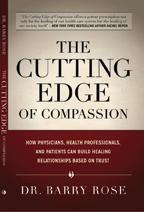
Dr. Barry Rose offers ways to heal a disjointed health care system in his new book, “The Cutting Edge of Compassion: How Physicians, Health Professionals, and Patients Can Build Healing Relationships Based on Trust.”
“The Cutting Edge of Compassion,” released by Morgan James Publishing on Sept. 20, is Dr. Rose’s way of giving back to the field in which he has dedicated more than 30 years as a practicing physician. Dr. Rose, a Jewish doctor, lives and works in San Francisco, but originally hails from Kansas City.
“This is my way of giving back,” Dr. Rose said. “Improve the system that has some issues now.”
Dr. Rose is an orthopedic surgeon, chief of orthopedic surgery and surgical division head for the Alameda division of Palo Alto Foundation Medical Groups. Everyone from patients, physicians and allied health care professionals are frustrated with the delivery of health care, Dr. Rose says. The system is disjointed. Health care does not have the continuity it once enjoyed when family doctors had a hand in their patients’ entire care process from seeing them in their office to meeting them at the hospital and consulting with other physicians to come up with a treatment plan.
“Your primary care physician does not do all that,” Dr. Rose said. “When you go to the hospital today you see a hospitalist. You don’t see your family doctor. Health care is fragmented. It’s not necessarily the best model these days. That is part of why I wrote what I wrote.”
The mission of Dr. Rose’s book is to bridge gaps, promote patient advocacy and impart points of view from both the patients’ experience and health care professionals to better understand one another. The book is intended for patients, physicians and other health care professionals. We all need to work together to find solutions, he said.
“It gives us an idea how we can all work better together,” Dr. Rose said.
Readers will be able to relate to “The Cutting Edge of Compassion,” Dr. Rose says. The book is story based, beginning with his childhood and continuing through his training and practice. In the book he addresses insurance companies to pharmaceuticals and the disconnection between Western and Eastern medicine philosophies. Some patients, for instance, may want to combine Western and Eastern modalities in their care plan. If that is the best way to promote healing, patients should be encouraged to pursue acupuncture or energy healing if that is what they want, he said. Dr. Rose says health care should be a team approach. Physicians should work to understand the range of personalities in their patients and not be taken aback, for example, if a “techy” type patient wants specific answers to technical questions. In “The Cutting Edge of Compassion” Dr. Rose wants to teach patients to advocate for themselves and what to look for in a physician in order to receive the medical help they need. It takes trust and learning how to better connect with one another.
“It’s a whole approach to what will help the patient get better,” he said. “Narrow the gap. The patient gets better and the care is coordinated.”
Dr. Rose is especially interested in teaching patient advocacy after experiencing the other side of health care as a patient. In November of 2015 he was diagnosed with cancer. He received radiation and chemotherapy and stopped working for three-and-one-half months. Dr. Rose completed the treatment, is cancer free and working once again. It was a tough but successful treatment going through chemotherapy and radiation, he said. He was fortunate to have a family member who was a strong advocate on his behalf. Dr. Rose has since presented lectures on his experience as a cancer patient. The episode made him a stronger patient advocate, he said. He is already at work on another book dedicated to patient advocacy.
“It was a real eye opener to be on the other side care,” Dr. Rose said. “My wife was an incredible advocate — I am lucky to have her helping me through it all. I don’t know what other people get.”
Dr. Rose says that some of the problems that patients face is that they are often in a state of fear and don’t know what questions to ask. Challenges physicians encounter include a lack of personnel, additional time spent for record keeping, following up on lab work and answering follow-up questions after patient appointments.
“Economization of health care has made physicians not want to practice,” he said. “There are a lot of things not enjoyable about practicing medicine. That needs to be addressed also.”
Dr. Rose has been practicing as an orthopedic surgeon in California since 2006. He practiced in Kansas City for 14 years, where he built the orthopedic expansion for Menorah Medical Center in Overland Park, prior to moving to California. Bernard Brown, chairman of the board of Menorah at the time, proved to be a strong influence on Dr. Rose. Near the end of his life Brown was blind and Dr. Rose recalls reading his writings and ideas out loud to Brown. Brown encouraged Dr. Rose to publish his ideas.
“He made me promise I would share my thoughts — get my thoughts and words out there,” Dr. Rose said. “It was a promise I made to him before he died. He was like a second father, a mentor. He was the real reason I came back to Kansas City and Menorah, moving out south. He was very dedicated to Jewish health care.”
Dr. Rose grew up in Kansas City. He earned his medical degree from the University of Kansas where he fulfilled his internship and residency. He also completed a hand and upper extremity fellowship at the University of California — San Diego. He now lives in the San Francisco bay area with his wife, Rose, but says his roots run deep in Kansas City.
“Dad is still there. The kids live there,” he said. “I’ve got super deep roots in Kansas city.”